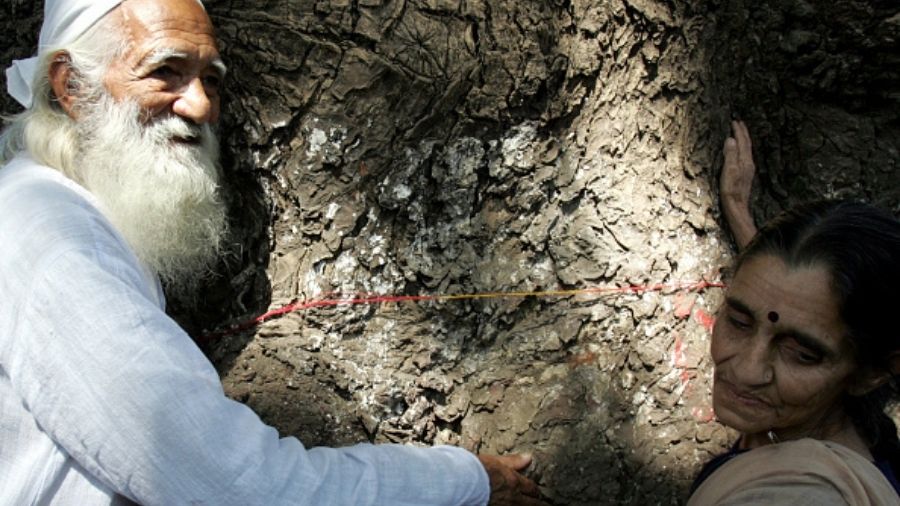Sir — The demise of the noted environmentalist and a key architect of the Chipko movement, Sunderlal Bahuguna, as a result of Covid-19 marks the end of an era of Gandhian activism in the subcontinent (“Covid claims protector of trees”, May 22). To rouse the consciousness of the people and the government about the dire consequences of deforestation and how harmonic living can ensure a healthier tomorrow, Bahuguna began long marches along the hilly regions, stretching over thousands of kilometres.
He was remarkably skilled in helping join the dots between the local and the global communities.
Bahuguna had long warned people about the high costs of the unchecked march for profit. The recent disasters in his beloved Himalayas, from the Kedarnath floods to the Chamoli tragedy, are a reminder that ignoring Bahuguna’s lessons and messages will only be to our own detriment.
S.S. Paul,
Nadia
Sir — Sunderlal Bahuguna, who died of Covid-related complications, will always be remembered for being an important part of the iconic Chipko movement where he mobilized rural women to hug trees and stop them from being felled in the early seventies. The movement set off a new understanding about the value of forests in India.
Bahuguna also championed the cause of organic farming, underlining the danger of pesticides and chemical farming. He emphasized the protection of sustainable livelihoods along with the protection of the environment. Bahuguna was also involved in several activities relating to the regeneration of degraded forests. His opinions on environmental issues were widely sought and he was honoured with several prestigious awards. His loss will be felt by generations to come.
Ranganathan Sivakumar,
Chennai
Sir — It was heartbreaking to read about the death of the renowned environmentalist, Sunderlal Bahuguna, who lost his battle against Covid-19 last week. The nonagenarian activist was admitted to the All India Institute Of Medical Sciences in Rishikesh after his oxygen levels started fluctuating.
Bahuguna, a pioneer of the Chipko movement, was known as Vrikshamitra to the world and inspired many with his dedication to the preservation of the environment. He made the issues of water, forests and land his priority, and fought for people’s rights. He was awarded the Jamnalal Bajaj Award in 1986 and the Padma Vibhushan in 2009 for his significant contribution to the field of environmental protection. His passing is an irreparable loss to the country.
Bhagwan Thadani,
Mumbai
Safety for all
Sir — It was a relief to learn that the Union health ministry has decided to revise an earlier policy to allow family members and dependents of employees to get inoculated at industrial and workplace Covid-19 vaccination centres. The earlier notification, which had kept family members out of the purview, was a matter of grave concern as many were worried that they might not be able to ensure the vaccination of their loved ones given the acute shortage of vaccines. It is hoped that the revised policy will help accelerate the vaccination drive in India.
Ananya Sen,
Calcutta
Way forward
Sir — In his article, “Let the duel begin” (May 19), Arghya Sengupta makes an interesting point by arguing that the broader spirit of diversity, and not just secularism, should be foregrounded in the fight against the divisive agenda of right-wing fundamentalism. However, going beyond the religious and geographical diversities highlighted in Sengupta’s article, I would argue that the concept of diversity should be expanded to also encompass diversities of economic status, age and, most importantly, gender. The inclusion of more women at decision-making levels will result in their taking positions that are independent of men, and eventually create an electorate that the exclusionist narrative of fundamentalists would not be able to counter.
Furthermore, the ethos of diversity should be underpinned not by the principle of equality, but by that of equity. Equality tries to ensure the same resources and opportunities for everyone. But equity recognizes that each individual’s circumstances are different, and tries to allocate resources and opportunities accordingly. This may result in affirmative action in favour of certain sections of society, possibly to the discomfiture of others but it is fundamental that we approach progress in this manner.
Jit Roy Chowdhury,
Calcutta










